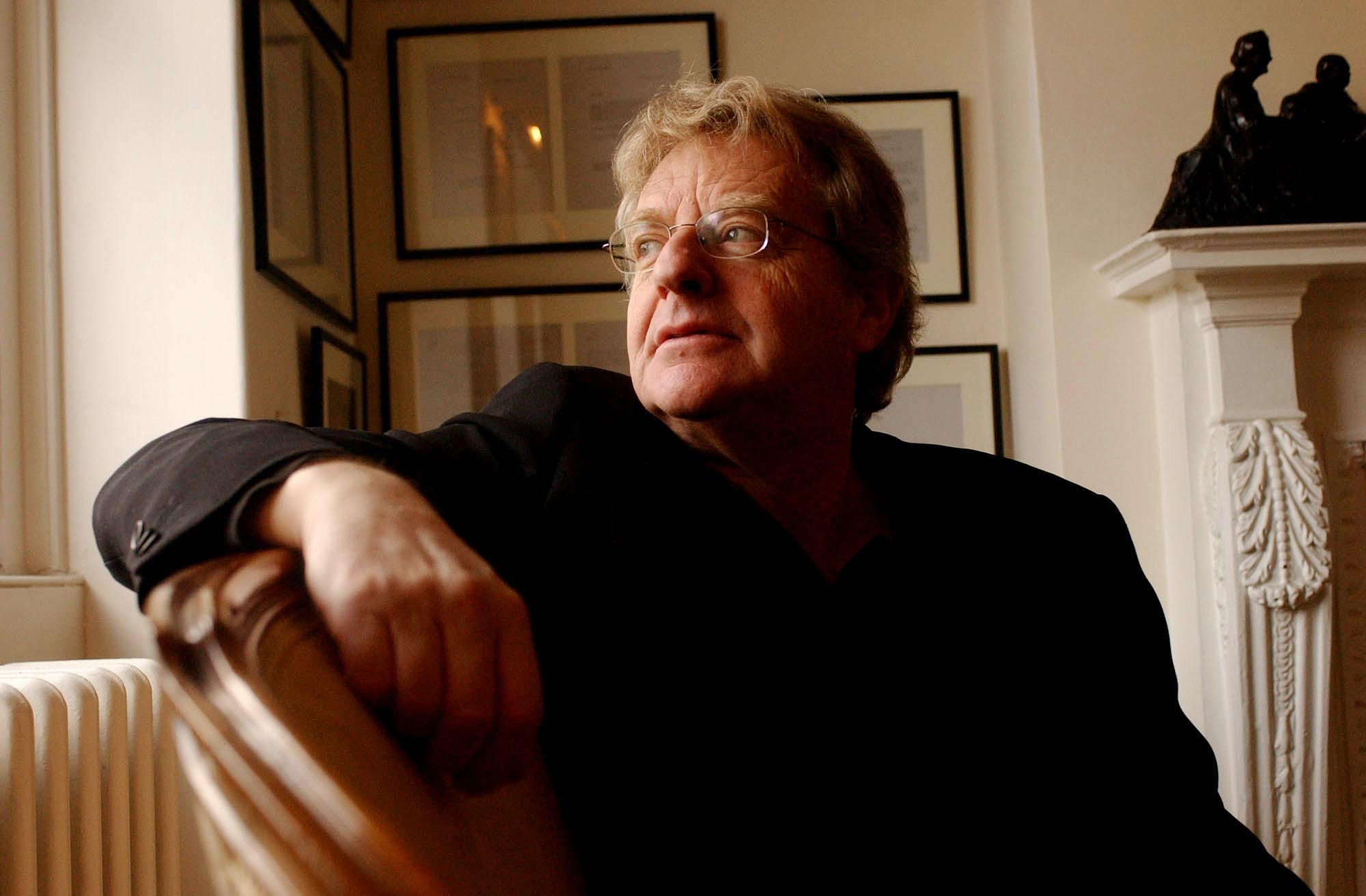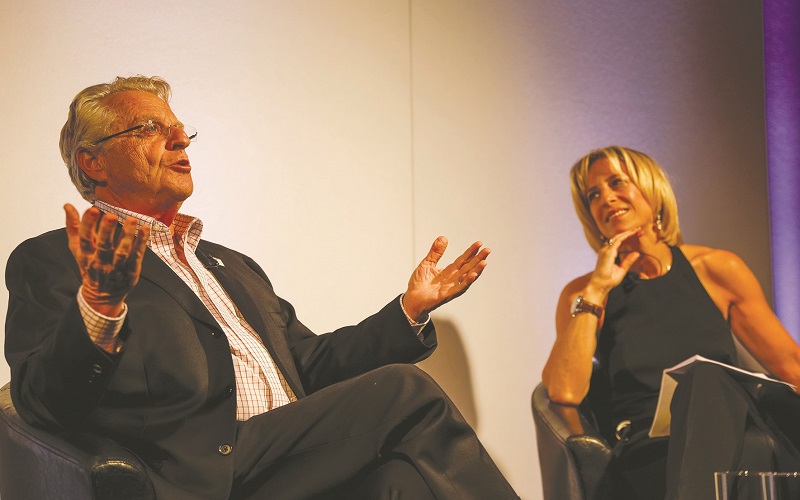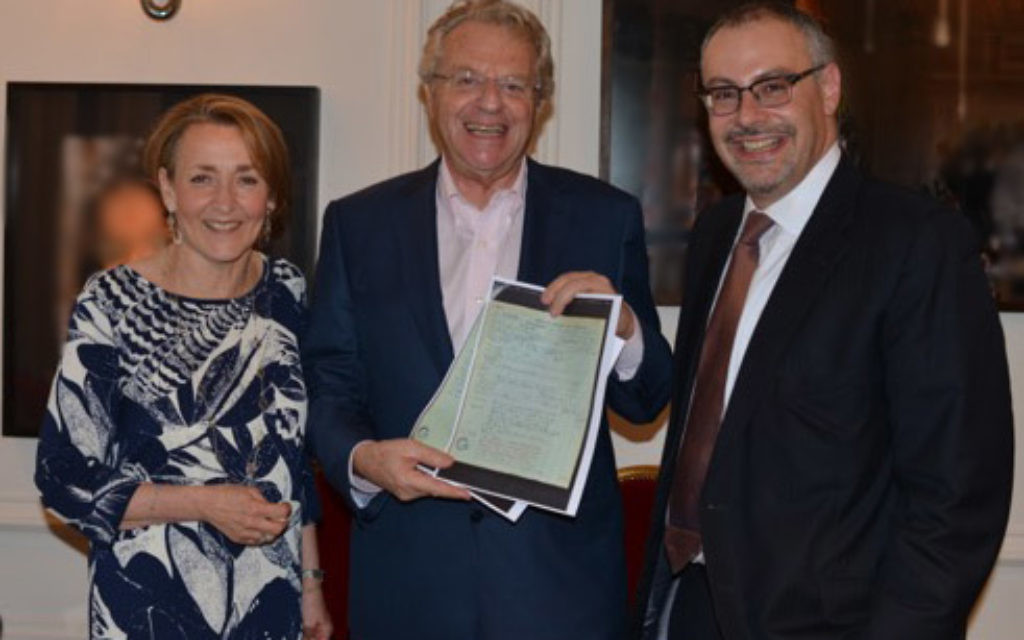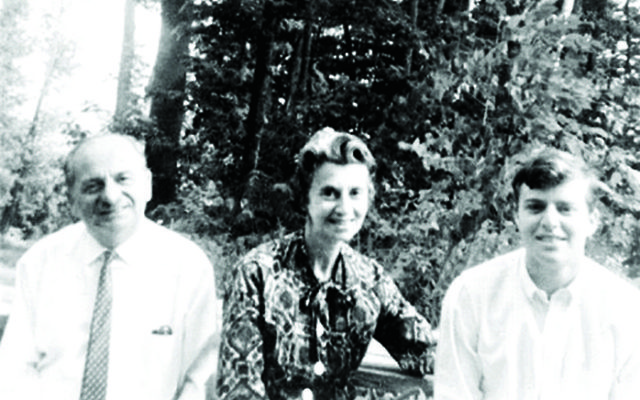Jerry Springer: the Jewish life and times of a cultural icon
The Jewish cultural icon, whose family fled from Germany to England during the Holocaust, died peacefully at his home in Chicago after a brief illness
Jewish cultural icon Jerry Springer has died aged 79.
The talk show host was best known for showcasing dysfunctional families on The Jerry Springer Show, which ran from 1991 until 2018 in the US.
Springer was born in Highgate London Underground station on February 13 1944, while it was being used as a bomb shelter. His parents, Margot and Richard Springer – who had in 1939 fled from Germany to England during the Holocaust – later settled in the Queens borough of New York City.

Springer traced his family roots in a 2008 episode of BBC family tree research programme, Who Do You Think You Are?, where he visited Landsberg (now Gorzów, part of Poland), where his father once owned a successful shoe shop.
He discovered that 27 other members of his family, including his widowed grandmothers, Selma Springer and Marie Kallman, were murdered in the Holocaust.
The family tried and failed to help Marie escape to the US; sent to the Lodz ghetto in Poland, she was crammed into a cattle wagon and sent to her death at Chelmno extermination camp. Selma was deported to Theresienstadt, a Jewish ghetto outside Prague in 1942, dying aged 72, in the ghetto hospital.
Dr Tony Grenville, the historian from the Association of Jewish Refugees, (AJR) who appeared on Jerry’s Who Do you Think You Are? episode tells Jewish News: “My impression of him was completely different from his public persona. He was very pleasant, very intelligent, very sensitive and generally rather a pleasure to deal with, which was not what I was expecting.”

Grenville says that “one thing, to my amazement, they left out of the programme, was the three or four minutes I was asking him about his parents’ move to the US.
Jerry said to me: ‘I’ll tell you a story. When my father got older, he wasn’t safe to drive. And every time he got into the car, my mother got very anxious. So, I spoke to him and said ‘Dad, you really ought not to drive any more.’ The father said to Jerry: ‘Listen, we’ve survived two world wars in Europe. We didn’t want to survive a third. So, I’m never going to sell that car. You never know when you will have to escape.’
“And Jerry then burst into tears and I wondered what I had done. I thought it was a very moving moment and showed how this anxiety, this deep anxiety had affected his parents. The father’s constant sense of never knowing when he’d have to escape – and how it had passed on to Jerry – inter generational transmission. And I had reduced Jerry Springer to tears; but they cut it out.”
In 2016 Springer thanked the “amazing efforts of so many” at the launch of the World Jewish Relief archives project, which digitised and made publicly available the personal records of more than 40,000 refugees for the first time.
Within those documents were ones pertaining to his own parents, a revelation at the time he said left him “blown away”.

In an article written in Jewish News, Springer said: “They showed that my parents got out just four weeks before the war started and based on the number at the top of their document, they were among the last 100 Jews to leave Germany. There was a name written on the card of their sponsor, someone called Goldberg. They didn’t know this person – they were probably just a member of the agency signing these to get as many Jews out as possible – but basically these people saved my parents’ lives and my sister, who was born a month later. Without them, I wouldn’t have been born either. These people reached out to us – even though they didn’t know who we were.”
He spoke further on his family history when interviewed by Emily Maitlis at the World Jewish Relief Annual Business Dinner in 2017, writing: “A general rule I always follow: if somebody saves my life, I’ll always show up at their dinner.”
World Jewish Relief tweeted one of many tributes to Springer on social media:
We are deeply saddened to hear about the passing of Jerry Springer, and our thoughts are with his family.
Jerry was a passionate supporter of our work and the role we played in rescuing his parent’s from Nazi-occupied Europe.https://t.co/ZGu0yevMNX
— World Jewish Relief (@WJRelief) April 27, 2023
The Association of Jewish Refugees (AJR) tweeted:
We were very sorry to hear about the passing of Jerry Springer. Our historian Dr Anthony Grenville appeared in Jerry's Who Do You Think You Are? programme talking about the migration to Britain of Jews fleeing Nazi oppression, which included Jerry and his family.
— The Association of Jewish Refugees (AJR) (@TheAJR_) April 27, 2023
On his own profile, Springer aptly referred to himself as “talk show host, ringmaster of civilisation’s end”.

Thank you for helping to make Jewish News the leading source of news and opinion for the UK Jewish community. Today we're asking for your invaluable help to continue putting our community first in everything we do.
For as little as £5 a month you can help sustain the vital work we do in celebrating and standing up for Jewish life in Britain.
Jewish News holds our community together and keeps us connected. Like a synagogue, it’s where people turn to feel part of something bigger. It also proudly shows the rest of Britain the vibrancy and rich culture of modern Jewish life.
You can make a quick and easy one-off or monthly contribution of £5, £10, £20 or any other sum you’re comfortable with.
100% of your donation will help us continue celebrating our community, in all its dynamic diversity...
Engaging
Being a community platform means so much more than producing a newspaper and website. One of our proudest roles is media partnering with our invaluable charities to amplify the outstanding work they do to help us all.
Celebrating
There’s no shortage of oys in the world but Jewish News takes every opportunity to celebrate the joys too, through projects like Night of Heroes, 40 Under 40 and other compelling countdowns that make the community kvell with pride.
Pioneering
In the first collaboration between media outlets from different faiths, Jewish News worked with British Muslim TV and Church Times to produce a list of young activists leading the way on interfaith understanding.
Campaigning
Royal Mail issued a stamp honouring Holocaust hero Sir Nicholas Winton after a Jewish News campaign attracted more than 100,000 backers. Jewish Newsalso produces special editions of the paper highlighting pressing issues including mental health and Holocaust remembrance.
Easy access
In an age when news is readily accessible, Jewish News provides high-quality content free online and offline, removing any financial barriers to connecting people.
Voice of our community to wider society
The Jewish News team regularly appears on TV, radio and on the pages of the national press to comment on stories about the Jewish community. Easy access to the paper on the streets of London also means Jewish News provides an invaluable window into the community for the country at large.
We hope you agree all this is worth preserving.






















